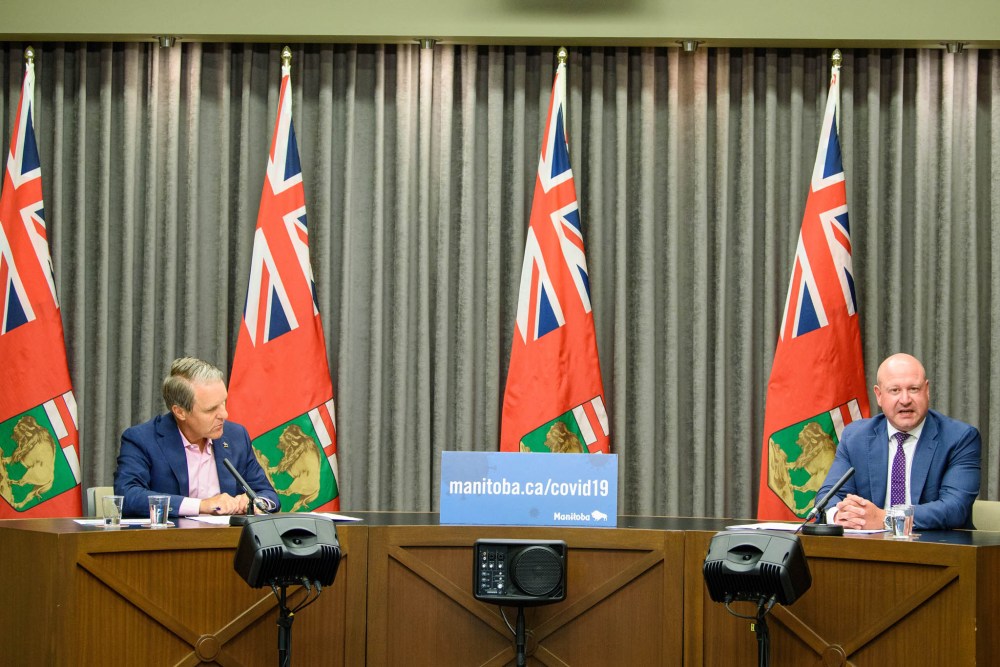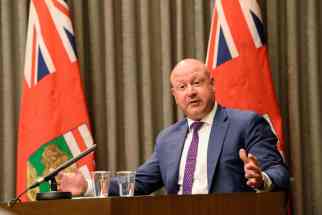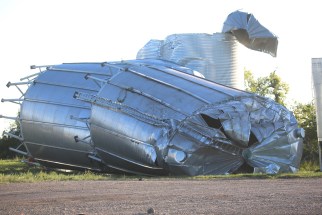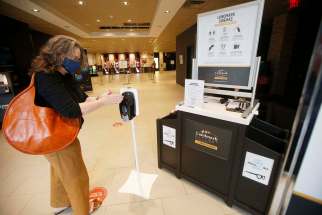Let COVID compassion eclipse stigmatization
Read this article for free:
or
Already have an account? Log in here »
To continue reading, please subscribe:
Monthly Digital Subscription
$0 for the first 4 weeks*
- Enjoy unlimited reading on winnipegfreepress.com
- Read the E-Edition, our digital replica newspaper
- Access News Break, our award-winning app
- Play interactive puzzles
*No charge for 4 weeks then price increases to the regular rate of $19.00 plus GST every four weeks. Offer available to new and qualified returning subscribers only. Cancel any time.
Monthly Digital Subscription
$4.75/week*
- Enjoy unlimited reading on winnipegfreepress.com
- Read the E-Edition, our digital replica newspaper
- Access News Break, our award-winning app
- Play interactive puzzles
*Billed as $19 plus GST every four weeks. Cancel any time.
To continue reading, please subscribe:
Add Free Press access to your Brandon Sun subscription for only an additional
$1 for the first 4 weeks*
*Your next subscription payment will increase by $1.00 and you will be charged $16.99 plus GST for four weeks. After four weeks, your payment will increase to $23.99 plus GST every four weeks.
Read unlimited articles for free today:
or
Already have an account? Log in here »
Hey there, time traveller!
This article was published 10/08/2020 (1949 days ago), so information in it may no longer be current.
An outbreak of COVID-19 infections in Brandon has revealed an ugly but inescapable reality about pandemics. They are not just public health crises; they are also a profound test of our collective capacities for fairness and tolerance.
Over the past two weeks, a cluster of new COVID-19 cases has erupted in Brandon, likely tied to a single traveller returning home from points east of Manitoba who did not strictly follow the 14-day quarantine requirements.
At Monday’s count, that cluster had grown to 64 cases, 22 of whom work at the Maple Leaf Foods meat packing plant in Brandon.
All of which begs the question — how did so many people become infected so quickly? Lamentably, neither Dr. Brent Roussin, Manitoba’s chief public health officer, nor Health Minister Cameron Friesen, were willing to provide much of an answer.
On Monday, as they have for the past two weeks, Roussin conceded the Brandon cluster was likely due to a lack of adherence to public health protocols, including hand hygiene and social distancing. Beyond that, not much else was offered.
How tight-lipped is the province’s top doctor? To date, despite widespread media coverage, Roussin will not even say the words “Maple Leaf Foods” in his briefing, referring to the plant as “a Brandon business.”
What is Roussin not saying, and why is he not saying it? There are intriguing hints coming from other sources.
Last week, Maple Leaf Foods CEO Michael McCain issued a statement to clarify that, although some of the individuals who have tested positive in the Brandon cluster work at his plant, they are not contracting the disease at work.
In particular, McCain stated that the Maple Leaf workers who had tested positive “are linked to community gatherings and interactions.” He urged the City of Brandon to take more stringent steps to get all citizens to “adhere strictly to social distancing within the community, including mask usage throughout the community continuously.”
Maple Leaf workers who had tested positive “are linked to community gatherings and interactions.” – Maple Leaf Foods CEO Michael McCain
McCain would not say exactly who he was talking about, but the evidence is growing that innocent community gatherings involving tightly knit communities of immigrant workers, most of whom have come through the province’s provincial nominee program, are the victims of this cluster.
This is where we get to test our capacity for fairness and tolerance.
Concerns about individuals and communities being stigmatized or discriminated against because of COVID-19 are real and pressing. Under threat, it’s easy to give in to our baser instincts and punish those who we believe are responsible for perpetuating the virus.
Those baser instincts are, of course, completely erroneous. Science is clear: although some people are more vulnerable because of socio-economic factors, the virus cares little about the age, gender, ethnicity or religious beliefs of its victims.
These were the exact concerns expressed in April when two huge outbreaks of COVID-19 cases in Alberta were tied to two meat-packing plants where the majority of workers were either immigrants or temporary foreign workers. And in Ontario last June, when hundreds of cases were tied to migrant farm workers.

Those stories ultimately revealed that it was sub-standard living and working conditions, and not the ethnic profiles of the temporary foreign workers, that was at the heart of those clusters.
Similar concerns arose here when the province identified outbreaks in five Hutterite colonies, two of which voluntarily isolated all community members. The outbreaks were tied to recent travel to Alberta.
Following widespread media reports, senior Hutterite leaders threatened to file a complaint with the Manitoba Human Rights Commission, alleging that identifying their communities amounted to “cultural and religious profiling.”
The fear that the Hutterites have about being stigmatized is not evidence of their shortcoming; it is proof of the flaw in human nature that makes us quick to judge and condemn a group of people who need our compassion and understanding.
The real question raised by the Brandon outbreak is how a similar cluster has not been triggered in Winnipeg, where news stories have documented regular, wanton disregard for social distancing on bar patios and nightclubs?
Our collective ignorance ultimately denies us the information we need to effectively fight clusters.
If anyone deserves to be judged, it is the Manitobans who throw pandemic caution to the wind to drain pints on a patio, not the Manitobans who gathered for community picnics unaware of the threat in their midst.
Our collective ignorance ultimately denies us the information we need to effectively fight clusters.
More information — not less — is a key to an effective pandemic response. We need to know where the greatest threats lie. Manitoba’s public health officials do provide us with some of that, but they regularly deny us the kinds of information regularly shared in other jurisdictions.
An information vacuum is also fertile ground for rumour and innuendo, the most destructive channels for stigmatization.
Rationing information can be, in some instances, just as destructive as sharing. Advocates for migrant workers used the Alberta and Ontario cluster stories as springboards to lobby for better working and living conditions. If that information had been withheld, the broader public would have continued to be ignorant about their plight.
An information vacuum is also fertile ground for rumour and innuendo, the most destructive channels for stigmatization. The threat of stigmatization could be easily balanced by detailed information about who is most affected by an outbreak and how they are responding. Without confirmation, people are left to their own, often destructive, conclusions.
Roussin and Friesen have talked about introducing a new reporting regime that allows more information to be shared about exactly where outbreaks are taking place. That new regime must strike a better balance between protecting individuals and communities from judgment, and providing the public with more and better information.
To date, the Tory government has erred on the side of less information and maybe for some very good reasons. Still, it’s not clear that less information has left us all better off.
dan.lett@freepress.mb.ca

Born and raised in and around Toronto, Dan Lett came to Winnipeg in 1986, less than a year out of journalism school with a lifelong dream to be a newspaper reporter.
Our newsroom depends on a growing audience of readers to power our journalism. If you are not a paid reader, please consider becoming a subscriber.
Our newsroom depends on its audience of readers to power our journalism. Thank you for your support.














